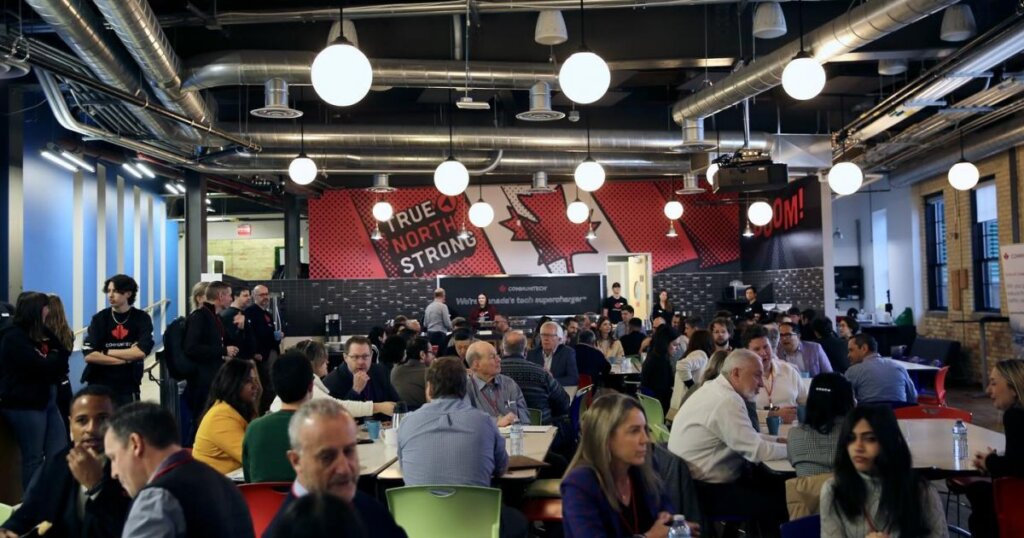Home » Roundup for February 2024 – Communitech
Roundup for February 2024 – Communitech

The Accelerator Centre is taking to the skies
February took off with an exciting announcement from the Accelerator Centre. Together with the Region of Waterloo and NAVLUE, the AC announced the launch of the inaugural Aerospace Accelerator Program. The program will run out of the Accelerator Centre’s space in the David Johnston Research + Technology Park and is designed to support and accelerate the development of innovative and sustainable aerospace solutions.
Tabatha Laverty, Vice President of Marketing and External Relations at the Accelerator Centre, said the idea for an aerospace accelerator came from conversations with Matthew Chandy, Director of Innovation & Economic Development at the Region of Waterloo.
“We talked about the priorities of the Region from an innovation standpoint. We talked about waste management, housing and infrastructure, but the conversation always returned to the airport. The Region has this incredible asset in the airport that is underutilized in many ways. We kept coming back to making the Region of Waterloo a hotbed for aviation and aerospace innovation,” said Laverty.
Magnifying success
On Jan. 30, Kitchener-based ICSPI announced the release of its new Redux AFM, a special kind of microscope called an atomic force microscope (AFM). Unlike traditional microscopes that use lenses and light to magnify an object, AFM uses a probe to feel the surface of the sample using a probe. As the probe moves along the sample's surface, a sensor measures how the probe responds to its atoms and molecules. The result is a detailed 3D map allowing researchers and scientists to see the sample at an atomic and molecular level
“It's really a marvel of engineering. It's like something out of Star Trek where you can look at a sample down to the nanometre or sub-nanometre level on a benchtop in just a few minutes,” said David Morris, director of operations at ICSPI.
Wiring tech startups for the global stage
Over 90 per cent of businesses in Canada are classified as small businesses and helping them scale is critical to success on the world stage. Nina Tangri, Ontario’s Associate Minister of Small Business, visited the Communitech Hub on Feb. 16 to discuss some of the unique challenges startup founders face.
“We’re really trying to keep you all here in Ontario so we don’t lose your great talent to other jurisdictions,” said Tangri. “We want the world to know, globally, that we’re not just open for business, but that we have the best talent in the world.”
Catching post-op issues faster
Fresh off a mid-October 2023 $15 million raise and a $1.4 million grant from the province in January, FluidAI is quickly gaining traction with its Origin medtech device. Origin can analyze millions of pieces of information from a patient’s fluids to help identify problems before they become critical.
Founded ten years ago by Youssef Helwa, FluidAI’s technology is now helping patients in hospitals from Toronto and Waterloo Region to Ohio and Texas.
Sharing AI insights
Ramy Nassar worries about artificial intelligence (AI) so you don’t have to. The award-winning speaker and facilitator is leading an exclusive AI workshop at The Walper Hotel in Kitchener on March 5 before the annual Communitech CEO Dinner. The event will explore the multifaceted impact of AI on businesses, employees and communities, and strategies for navigating Canada's competitive position in the global AI landscape.
“While we all inherently understand what's good and what's not, it's imperative for business leaders to advocate for ethical practices that benefit customers, employees and end-users,” Nassar said. “As a community of technologists and leaders, it's our responsibility to uphold ethical standards in AI usage.”
Reducing pyjama time
For many clinicians and physicians, work doesn’t stop when their shifts end. “Pyjama time” – after-hours work required to catch up on data entry – is a leading cause of burnout for health-care professionals.
Finding innovative ways to reduce that burnout was the theme at the Communitech Fast Track Health Showcase on Feb. 27, 2024. Six Canadian technology companies pitched their solutions for the opportunity to partner with health-care organizations across the country.
“Burnout is a complex topic, and we need to start collectively addressing and solving it together,” said Dr. Payal Agarwal, Integrated Chief Information and Innovation Officer at Grand River Hospital and St. Mary’s General Hospital. “In almost every way, tech makes our lives easier. But in healthcare, technology often makes it harder to care for our patients. We have to do better with technology.”
Other news
This edition of the Roundup was compiled by Alex Kinsella. Sign up to receive the Roundup each month by visiting communitech.ca/technews and scrolling to the bottom of the page.
Communitech
https://communitech.ca
"Communitech helps tech-driven companies start, grow and succeed. Communitech was founded in 1997 by a group of entrepreneurs committed to making Waterloo Region a global innovation leader. At the time it was crazy talk, but somehow this community managed to pull it off. Today, Communitech is a public-private innovation hub that supports a community of more than 1400 companies — from startups to scale-ups to large global players. Communitech helps tech companies start, grow and succeed in three distinct ways: - Communitech is a place – the center of gravity for entrepreneurs and innovators. A clubhouse for building cool shit and great companies. - Communitech delivers programs – helping companies at all stages with access to capital, customers and talent. We are here to help them grow and innovate. - Communitech partners in building a world-leading ecosystem – making sure we have all the ingredients (and the brand) to go from a small startup to a global giant."


